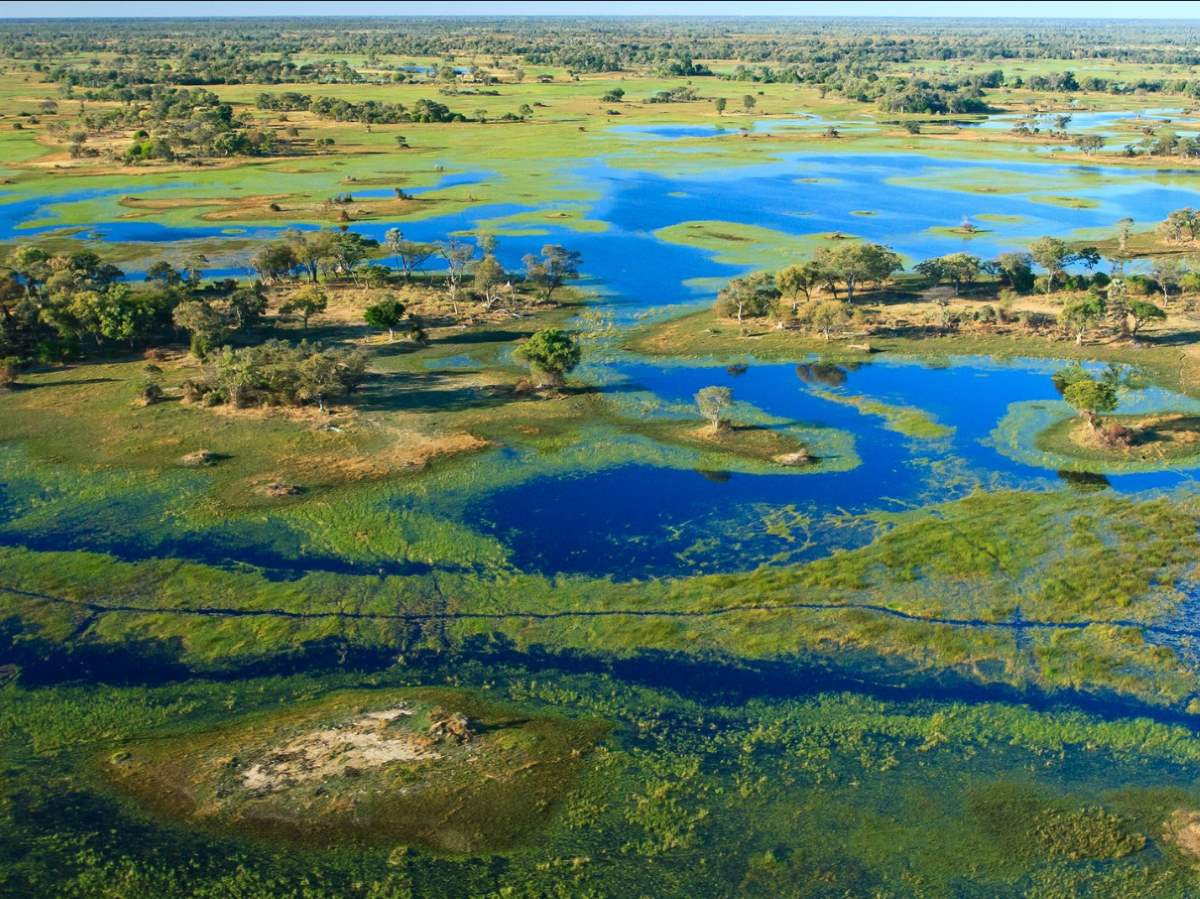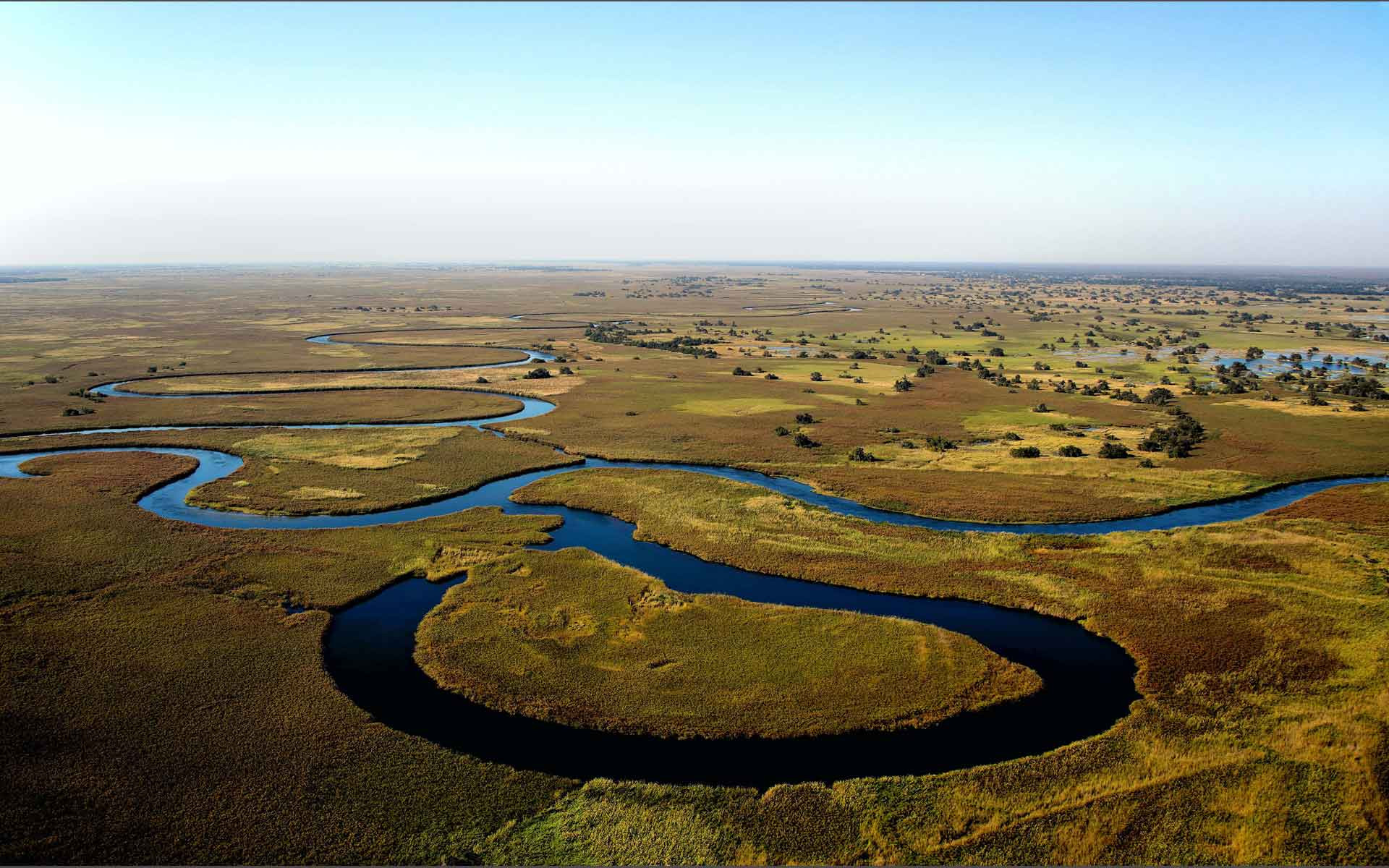Botswana is famous around the world for two main things – diamonds and wildlife. The economic importance of diamonds is obvious. But biodiversity and ecosystems are equally integral to the country’s identity and could play an increasingly important role in its economic development. Vast landscapes have, so far, remained relatively unscathed by human activity in Botswana, one of the world’s most sparsely populated countries. Great herds of iconic animal species still roam across the national parks and game reserves that cover around 40% of the country. The Okavango Delta is especially celebrated as one of Africa’s most unique and precious ecosystems. In 2014 it was designated as a UNESCO World Heritage Site.
Botswana boasts the world’s largest elephant herds, with an estimated population of 132,000 in 2022. It is also home to countless other species of megafauna, including all the African “Big Five” and is among the last refuges of the African wild dog (also known as the painted wolf).
Biodiversity Beyond Tourism
Biodiversity has been an important source of revenue for Botswana for many years. The country is among the premier safari destinations in Africa. More than one million tourists visit annually, largely drawn by the prospect of catching a glimpse of its spectacular wildlife.
High-end “eco-tourism” is a lucrative industry. The International Finance Corporation (IFC), an arm of the World Bank, estimated in a 2022 report that tourism accounts for almost 10% of Botswana’s GDP when indirect contributions are included. Yet, as Botswana seeks to diversify its economy, the tourism industry alone will not be enough to ensure the country’s biodiversity is protected.
Despite the importance of wildlife-related tourism to Botswana’s economy, the IFC warned in 2022 that “both visitor volumes and receipts have levelled off” after rapid growth in the 1990s and early 2000s. It added that “governance, coordination, and strategy issues threaten the sector’s long-term competitiveness and attractiveness.” Climate change and land degradation were also cited as long-term threats. Although tourist arrivals have now rebounded after the Covid pandemic, government agencies have, at times, been slow to capitalise on opportunities to capture revenues from wildlife tourism.
Fees to enter national parks were not raised for more than 20 years until 2022. In a report on the impact of raising fees, Cyril Taolo, acting director of the Department of Wildlife and National Parks, noted: “We are neither maximising our benefits for the conservation and management of our natural assets nor promoting sustainable economic growth if tourists have to pay the same fees as they did two decades ago.”
When fees were eventually raised, after a benchmarking exercise undertaken with assistance from the UN’s Biodiversity Finance Initiative, the impact was significant. The updated fees brought in $7.8m, compared to an original forecast of only $1m.
Beyond Traditional Tourism
While there is certainly room for growth – including through efforts to attract more visitors from countries such as China and India – there are also questions over the future of tourism in Botswana.
For one thing, pressures from economic development in other sectors threaten to undermine the natural ecosystems that attract tourists to Botswana.
The government controversially granted a permit allowing a Canadian company to drill for oil in part of the Okavango Delta in 2020. Conservation groups have waged a major public relations campaign to prevent drilling from taking place. Motshereganyi Virat Kootsositse, CEO of conservation charity BirdLife Botswana, said in a statement that allowing oil drilling in the delta, with its risks of pollution, poses a threat to the tourist industry and would be “akin to cutting off a nation’s hand”.
Competition with agriculture is another longstanding challenge that is set to become more intense. The government of Botswana is seeking to reduce the country’s dependence on food imports and to encourage greater domestic production. Beef is already among the country’s most significant export commodities, and the horticulture sector has been identified as a priority sector for growth. More land for cattle and crops, however, potentially means encroaching onto the ecosystems that sustain wildlife in the country.
Human-wildlife conflict is, indeed, a longstanding concern. The government lifted a ban on elephant hunting and began awarding licences to hunters in 2019. This “trophy hunting” is seen as a way to control elephant numbers, while also raising revenues.
The decision to allow trophy hunting has proved unpopular internationally, but Botswana’s government has stuck to its guns. In response to a proposal in Germany to ban the import of elephant trophies, President Mokgweetsi Masisi threatened earlier this year to send 20,000 of the animals to the European country to see how it copes when elephants “roam free”. Against this backdrop, organisations are looking for new ways to help Botswana earn revenues from its biodiversity while also managing human-wildlife conflicts.
Biodiversity Credits: A New Frontier
One option is for conservation projects to sell “biodiversity credits”. These work in a similar way to the more established carbon credits; instead of setting up a market for removing or avoiding carbon emissions, their aim is to increase biodiversity. Organisations that want to contribute to biodiversity conservation pay for credits in return for conservation groups meeting commitments to enhance biodiversity in a defined area.
Globally, the market for biodiversity credits remains extremely nascent, with a total value of just $2m to $8m according to a recent report by the UN Environment Programme. However, with growing global concern over nature loss, governments, corporates and international organisations are paying increased attention to ways to meet the financing gap for conserving nature. There is also potential for biodiversity goals to piggyback on more conventional carbon credit projects, many of which promise to maintain or strengthen ecosystems that remove carbon from the atmosphere.
Sylva, an environmental services company, is partnering with the Great Plains Foundation, a conservation organisation, to launch the first biodiversity credit projects in Botswana.
Marc Maleika, Sylva’s founder, says that biodiversity credit projects are needed in Botswana, given that there are limits to what can be achieved simply by conserving land for the benefit of eco-tourists.
“The beauty of biodiversity credit projects, compared to what’s happening in conservation now, is that the increase in conservation is directly linked to an incentive,” he says. “If your work is not resulting in a durable, additional, measurable and verifiable improvement, you’re not getting that carrot.” Credit projects can help “bring some rigour and digitalisation into conservation that didn’t necessarily always exist before,” he adds.
A Community-Driven Approach
A key factor behind the success of such projects is achieving buy-in from communities that live on or near the land being conserved. This means that a share of the revenues from the credits must flow towards the community; in return, community members can be a first line of defence against threats such as poaching.
Ultimately, Maleika is convinced that Botswana needs to ensure that its remarkable natural riches are preserved long into the future. “Once you increase biodiversity, it’s good for everything,” he says. “The ecosystem becomes more productive. A more productive ecosystem is one that stores more carbon, that retains more water, that provides a better home for pollinators. It’s good for the community, it’s great for tourists.”
“If Botswana realises the value of nature-based solutions, they’ll find they are sitting on treasure,” Maleika says.
The Future of Biodiversity in Botswana
The success of biodiversity credits and other nature-based solutions could provide Botswana with a vital pathway towards ensuring the long-term sustainability of its remarkable ecosystems. These efforts are critical in a world grappling with climate change and biodiversity loss. The Okavango Delta, a natural wonder that draws tourists from around the world, may hold the key to a sustainable future for Botswana. But it remains to be seen if the government can effectively balance economic development with environmental protection and embrace the potential of nature-based solutions.


















